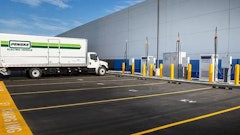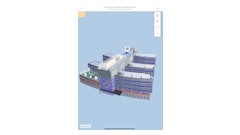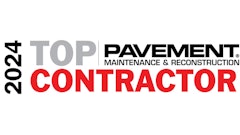
Brad Jacobs, former CEO of XPO Logistics, launched QXO, Inc., what is projected to be a market leader in building products distribution.
“QXO’s strategy is to create a tech-forward leader in the building products distribution industry through accretive M&A and organic growth, including greenfield openings, with the goal of generating outsized stockholder value,” Jacobs says.
“We expect to achieve a revenue run-rate of at least $1 billion by the end of Year 1, at least $5 billion within three years, and tens of billions of dollars over the next decade,” Jacobs adds. “QXO’s scale should elevate the customer experience, increase sales force effectiveness and enable margin expansion.”
Key takeaways:
- Jacobs will become chairman and CEO of QXO upon closing a previously announced $1 billion cash investment into SilverSun Technologies, Inc. After spinning off the existing SilverSun business, the remaining company, QXO, will be a standalone platform for significant acquisitions.
- Distributors of building products offer materials, finished goods, value-added solutions and expertise to a broad range of customers across residential, non-residential, industrial and infrastructure end-markets. Their products are used in new construction and in repair and remodeling.
- Key categories include access control, construction supplies, doors and windows, electrical components, fencing and decking, HVAC, infrastructure, landscaping, lumber, plumbing, pools, roofing, siding and water, among others.
According to a press release:
The industry’s nascent use of technology, particularly AI and B2B e-commerce, represents a compelling opportunity for tech-focused entrants. According to industry data, the percentage of industry revenue derived from e-commerce is only mid-single digits, and this share is expected to triple by 2030. Additional types of tech adoption by distributors have the potential to be transformative through price optimization, demand forecasting, warehouse automation and robotics, automated inventory management, route optimization for delivery fleets, supply chain visibility, and end-to-end digital customer connectivity. QXO’s strategy anticipates that these drivers, among others, will be central to the company’s goal of outsized stockholder value creation.
The building products distribution industry is highly fragmented, with approximately 7,000 distributors in North America and 13,000 in Europe, according to industry observers. The industry has generated compound annual revenue growth of 7% over the last five years, based on industry data, and continues to benefit from powerful secular growth drivers for building products distribution in the residential, nonresidential and infrastructure sectors.
For example, industry reports estimate that the supply of U.S. homes is 3 million units short of demand, potentially creating long-term tailwinds for both new construction and the repair and remodeling of aging homes. In the nonresidential sector, long-term demand is expected to be driven by growth across multiple industrial and commercial verticals, according to industry sources. Infrastructure should benefit from the widely reported need for repair or replacement of America's public transportation, utility and communication systems, among others.
These market dynamics, together with the fragmented nature of the industry, offer a significant opportunity to unlock growth potential through scale and technology. National distributors can serve large customers across multiple geographies and project types with standardized efficiencies, providing consistent, data-driven customer services across a broad operating scope. Additionally, a scaled technology ecosystem can expand the array of value-added services offered to customers, such as jobsite visibility into product consumption, digital configuration tools for custom ordering and tracking, and virtual design capabilities that interface with product order flow.
Jacobs has completed about500 M&A transactions in his career, and built five multibillion-dollar, publicly traded companies to date: XPO, Inc. (NYSE: XPO), one of the largest providers of less-than-truckload services in North America; GXO Logistics, Inc. (NYSE: GXO), the largest pure-play contract logistics provider in the world; RXO, Inc. (NYSE: RXO), a leading tech-enabled freight brokerage platform; United Rentals, Inc. (NYSE: URI), the world’s largest equipment rental company; and United Waste Systems, Inc., the fifth largest U.S. waste management company at the time of its sale.
Each of these companies has a history of attracting world-class talent, establishing advantages through technology, and scaling up through accretive capital allocations for M&A and organic growth.
This decades-long track record should position QXO to acquire exceptional businesses, integrate them effectively, improve margins and generate high returns on capital.
As previously announced, on Dec. 3, 2023, Jacobs Private Equity II, LLC (“JPE”), which is led by Brad Jacobs, and minority co-investors entered into an investment agreement (the “Investment Agreement”) with SilverSun Technologies, Inc. (Nasdaq: SSNT) (“SilverSun” or the “Company”), pursuant to which JPE and the minority co-investors will invest $1 billion in cash into SilverSun. The proposed investment is comprised of $900 million by JPE and $100 million by co-investors, including Sequoia Heritage.
Upon the closing of the equity investment, JPE will become SilverSun’s majority stockholder, Jacobs will become its chairman and chief executive officer, and SilverSun will be renamed QXO. QXO will become a standalone platform for Jacobs’ new venture following the spin-off of the existing business to SilverSun stockholders as of a record date that is expected to be one day prior to the closing of the investment.
Distributors of building products offer materials, finished goods, value-added solutions and expertise to a broad range of customers across residential, nonresidential, industrial and infrastructure end-markets. Their products are used in new construction and in repair and remodeling. Key categories include access control, construction supplies, doors and windows, electrical components, fencing and decking, HVAC, infrastructure, landscaping, lumber, plumbing, pools, roofing, siding and water, among others.

























